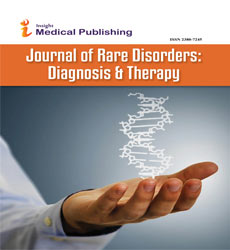Advancing Genetic Testing for Early Diagnosis of Rare Inherited Disorders
Margherita Milone
Department of pediatrics, Zahedan University of Medical Sciences, Zahedan, Iran
DOI10.36648/2380-7245.10.5.183
Margherita Milone*
1Department of Pediatrics, Zahedan University of Medical Sciences, Zahedan, Iran
- *Corresponding Author:
- Margherita Milone,
Department of Pediatrics, Zahedan University of Medical Sciences, Zahedan, Iran
E-mail: margherita@gmail.com
Received date: September 20, 2024, Manuscript No. IPRDDT-24-19962; Editor assigned date: September 23, 2024, PreQC No. IPRDDT-24-19962 (PQ); Reviewed date: October 07, 2024, QC No. IPRDDT-24-19962; Revised date: October 14, 2024, Manuscript No. IPRDDT-24-19962 (R); Published date: October 21, 2024, DOI: 10.36648/2380-7245.10.5.183
Citation: Milone M (2024) Advancing Genetic Testing for Early Diagnosis of Rare Inherited Disorders. J Rare Disord Diagn Ther Vol.10 No.5:183.
Description
The field of genetic testing has experienced exponential growth in recent years, catalyzed by technological advancements and an enhanced understanding of the human genome. Among its most impactful applications is the early diagnosis of rare inherited disorders. These conditions, often overlooked due to their low prevalence and complex clinical presentation, pose significant challenges for timely intervention. However, advancements in genetic testing are revolutionizing the healthcare landscape, enabling early detection, personalized care and improved patient outcomes. Rare inherited disorders are genetic conditions that affect a small percentage of the population, typically fewer than 1 in 2,000 individuals. These disorders result from mutations in specific genes, which can be inherited from one or both parents. Examples include cystic fibrosis, Huntington's disease, sickle cell anemia and Tay-Sachs disease. Despite their rarity, the collective burden of these diseases is substantial, affecting millions of individuals worldwide. The diverse nature of symptoms and the overlapping characteristics with other conditions often lead to delayed or missed diagnoses. Early identification is vital for mitigating disease progression and improving quality of life.
The role of genetic testing
Genetic testing is a fundamental of modern precision medicine. It involves analyzing DNA, RNA, or proteins to detect genetic variants associated with diseases. In the context of rare inherited disorders, genetic testing serves multiple purposes.
Accurate diagnosis: Traditional diagnostic methods often rely on clinical observations and biochemical tests, which can be inconclusive. Genetic testing offers a definitive approach by pinpointing the exact genetic mutations responsible for a condition.
Early detection: Pre-symptomatic or neonatal genetic testing allows for the identification of conditions before symptoms manifest. This is especially critical for diseases where early intervention can alter the course of the illness.
Risk assessment: Carrier screening helps identify individuals who are at risk of passing genetic disorders to their offspring, enabling informed family planning.
Personalized medicine: Genetic testing guides the development of customized treatment plans based on an individual’s genetic profile, optimizing therapeutic outcomes.
Applications: The integration of advanced genetic testing into neonatal and prenatal care has significantly improved the early diagnosis of rare inherited disorders. Techniques such as Non- Invasive Prenatal Testing (NIPT) analyze fetal DNA present in maternal blood to detect chromosomal abnormalities like Down syndrome and Edwards syndrome. In neonatal care, rapid sequencing technologies enable the identification of genetic conditions in critically ill newborns, often within 48 h. This is particularly beneficial for rare metabolic or immune disorders, where early intervention can prevent irreversible damage.
Ethical considerations: While genetic testing offers immense potential, it also raises ethical, social and practical challenges.
Data privacy and consent: The collection and storage of genetic data pose risks to individual privacy. Ensuring informed consent and implementing robust data protection measures are critical.
Access and equity: Advanced genetic testing technologies are often expensive and inaccessible in low-resource settings. Addressing disparities in access is essential for achieving global health equity.
Psychological impact: The knowledge of carrying a genetic disorder can lead to anxiety and stress. Genetic counseling is vital to help individuals and families navigate the emotional aspects of testing.
The future of genetic testing
The future of genetic testing holds exciting possibilities for the diagnosis and management of rare inherited disorders. Emerging technologies such as single-cell sequencing and gene-editing tools like CRISPR-Cas9 are expected to further enhance diagnostic precision and therapeutic options. Additionally, advances in computational biology and bioinformatics will enable the integration of multi-omics data (genomics, proteomics, metabolomics) to provide a holistic understanding of disease mechanisms. This integrative approach will prepare for personalized medicine at an unprecedented scale. Advancing genetic testing for the early diagnosis of rare inherited disorders is transforming the landscape of healthcare.
By leveraging innovative technologies, encouraging collaboration and addressing ethical and practical challenges, we can ensure that individuals affected by these conditions receive timely and effective care. As the field continues to evolve, the potential of a future where no patient is left undiagnosed or untreated comes closer to reality.
Open Access Journals
- Aquaculture & Veterinary Science
- Chemistry & Chemical Sciences
- Clinical Sciences
- Engineering
- General Science
- Genetics & Molecular Biology
- Health Care & Nursing
- Immunology & Microbiology
- Materials Science
- Mathematics & Physics
- Medical Sciences
- Neurology & Psychiatry
- Oncology & Cancer Science
- Pharmaceutical Sciences
